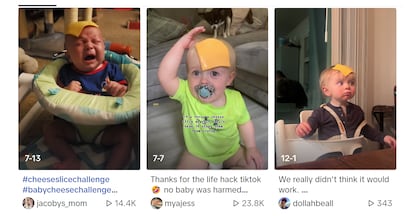‘Children are not dolls made for gaining followers’: This is how kids are affected by viral TikTok pranks
Videos of parents laughing as they prank or scare their children are garnering millions of views

A baby cries endlessly. A slice of cheese is tossed onto their face and, as if by magic, they stop crying. This is one of the viral pranks of TikTok. In other cases, parents break eggs on kids’ faces to see their reaction or make them believe that they’ve stained themselves with poop when it’s actually Nutella. TikTok is full of viral videos of progenitors humiliating their children. Several experts advise against such pranks due to possible negative consequences for minors.
All you have to do is search TikTok for “egg crack challenge” to see dozens of examples. Typically, the kids are hanging out with a family member who is cooking. They look on as their elder appears to be about to crack an egg into a bowl. But at the last moment, the adult cracks it against the child’s forehead. This elicits all kinds of reactions: from kids who get angry to those who try to take revenge, those who cry and those who are stunned and start complaining that it hurt.
“I take this type of prank on social networks very seriously because they are quite the disrespectful violation of children’s privacy,” says Amaya Prado, an expert in educational psychology and member of the governing board of the Official College of Psychology of Madrid. In other videos, babies react to a stuffed cactus that is immobile, until it suddenly begins to move and make noise. Most are startled and begin to cry. “Nothing like a parent making their child cry for strangers,” says one user who collects such TikToks.
Joanne Broder, expert psychologist in healthy relationships with technology and social media presence, thinks that these parents’ goal is to attract attention and get likes, comments and validation. “Not only are these parents physically and emotionally abusing their children through embarrassment, ridicule and humiliation, but the fact that they’re also doing it publicly means they’re flaunting it to the world,” says Broder, who is a member of the American Psychological Association.
Harmful pranks on children
What does it mean for kids when these videos are recorded and shared on social media? According to Prado, it depends on the tone, nature and frequency of the pranks. If they are constant and humiliating, “they can affect their self-esteem, making them feel belittled or ridiculed, especially because people will then see these pranks.” In addition, inappropriate pranks “can create anxiety and stress and have a lasting impact on their online reputation.” “Embarrassing and humiliating content can be shared and saved, affecting how they are perceived by peers and others online,” she says.
Babies, even if they’re not conscious of what is happening, can also suffer consequences. “Even if they don’t understand social media or the pranks in the same way an older child would, that online exposure can impact their emotional well-being.” Some studies have examined, for example, the influence that parents publishing videos of children on social media can have on their privacy. Prado stresses that TikToks can stay on the internet for a long time and affect kids when they are older.

“It could be that some children won’t immediately understand that they’re being mistreated, but they could manifest a post-traumatic stress disorder later on and ask themselves, ‘Why did my parents do this to me?’ It’s possible that they could grow up and feel anger, resentment and shame towards their parents,” says Broder. This kind of prank can break the trust between parents and children, as Deena Margolin, a psychologist who specializes in child-rearing, says: “Please, stop breaking eggs on kids’ heads. It can seem like a fun trend to you, but for your children, it’s a lapse in trust. You are supposed to be a safe person to them, not someone who surprises and hurts them.”
Not to mention, parents are role models for their children. “If you make disrespectful or insensitive jokes online, children can learn that this type of behavior is acceptable,” says Prado. Margolin agrees: “Don’t be surprised if your kids start misbehaving or hitting other kids, touching them without asking. They learned it from you.”
Ignorant pranks?
Kirstyn Sommer, a psychologist who researches the cognitive, social and emotional development of children at Griffith University in Australia, thinks that some parents carry out these pranks because they’ve seen so many other users do them and are unaware that they can be harmful to their children. She stresses that they probably don’t know the fine points of infant development and how kids’ brains work. “And probably, they don’t realize how hard an egg is,” she points out in a video posted on TikTok.
Not all pranks are created equal. To try for pranks that will be better received, Prado advises opting for ones “that generate positive laughter and are not intended to ridicule or hurt feelings.” The expert suggests making “gentle jokes about funny characteristics or common family habits, but always making sure it is done in a friendly and non-offensive tone.” Another alternative is to opt for posting funny photos with a lighthearted comment or jokes related to shared family experiences or situations. “This can create a sense of complicity and make the joke more fun for everyone.”
The most important thing is to “know limits and avoid sensitive topics or situations that could be uncomfortable for kids.” While there are pranks that may be less harmful to minors, Broder advises against sharing them on social media: “I can’t think of any reason to play pranks on children, especially on TikTok. These are human beings, not dolls to help parents gain followers or entertain them.”
Sign up for our weekly newsletter to get more English-language news coverage from EL PAÍS USA Edition
Tu suscripción se está usando en otro dispositivo
¿Quieres añadir otro usuario a tu suscripción?
Si continúas leyendo en este dispositivo, no se podrá leer en el otro.
FlechaTu suscripción se está usando en otro dispositivo y solo puedes acceder a EL PAÍS desde un dispositivo a la vez.
Si quieres compartir tu cuenta, cambia tu suscripción a la modalidad Premium, así podrás añadir otro usuario. Cada uno accederá con su propia cuenta de email, lo que os permitirá personalizar vuestra experiencia en EL PAÍS.
¿Tienes una suscripción de empresa? Accede aquí para contratar más cuentas.
En el caso de no saber quién está usando tu cuenta, te recomendamos cambiar tu contraseña aquí.
Si decides continuar compartiendo tu cuenta, este mensaje se mostrará en tu dispositivo y en el de la otra persona que está usando tu cuenta de forma indefinida, afectando a tu experiencia de lectura. Puedes consultar aquí los términos y condiciones de la suscripción digital.









































